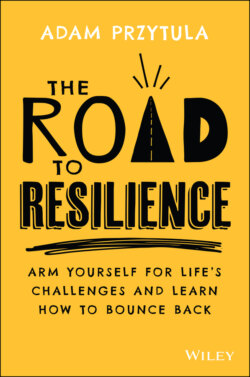Читать книгу The Road to Resilience - Adam Przytula - Страница 23
My story
ОглавлениеA few years ago, I was playing in a really good basketball team. It was halfway through the season and we'd won every match. We'd also won the previous season. One night, I was driving home when an ANT popped up in my mind: We scored 85 points tonight, but I only scored four. I must be ‘That Guy’ (the guy no‐one wants to pass the ball to because he’ll mess up and ruin the game). The thought seemed to come out of nowhere, but I challenged it: You’re having an ANT. Just because you’re thinking something, it doesn’t make it true.
After our next game, I approached a guy on our team who was an incredible player.
‘I'm thinking about stepping off the team,’ I confessed.
‘Nah, man, don't do that,’ he said. ‘We need you. Every time you step off the court our lead decreases because your rebounding and your defence are so strong.’
During the next match, I took more notice of how I contributed to the team, and I saw he was right. My job wasn't to take possession and score. I was a defender. That's right: I wasn't MJ (Michael Jordan), I was Dennis Rodman. Basketball teams need both types of players.
If I hadn't called myself out though, I would have gone into the next game acting like ‘That Guy’. I would have been thinking, No‐one wants to pass me the ball. This ANT would have affected my confidence and my game. Then my teammates really might not want to pass me the ball, and I'd risk really becoming ‘That Guy’. But I became aware of the ANT and I squashed it. By fact‐checking with another player and weighing up the evidence, I realised what I'd assumed wasn't true. I replaced my ANT with a positive thought — I'm a good defender — and it boosted my self‐esteem.
Two weeks later I severed my ACL (a ligament in my knee). It took me 12 months to get back on the court. Two weeks after I did my ACL, my basketball team lost their first match in two years. This reinforced to me that I wasn't the guy no‐one wanted to pass the ball to. My role on the team wasn't to score points, but that didn't mean I wasn't a valuable team member. From that point on, I had the conviction — and the repeated positive thought — that my team needed me to be able to function well.
Here is a photo of me excited about my first basketball match after tearing my ACL.
When I returned to basketball after recovering from my injury, I had to join a new team because my old team had fallen apart. We were winning three seasons in, and I started playing attack instead of defence. I was regularly scoring 20 to 25 points each game. I put this down to having improved my thinking around basketball, and actively working on raising my self‐esteem.
You too can ward off those ANTs by choosing to be aware of your thoughts and identifying whether or not they're true.
